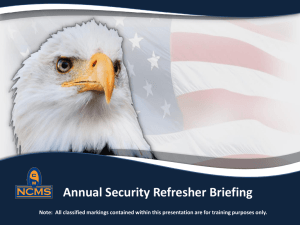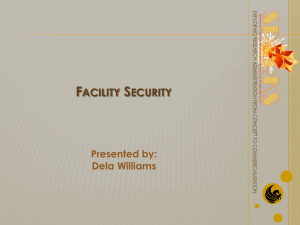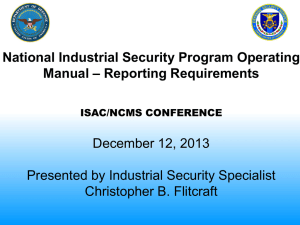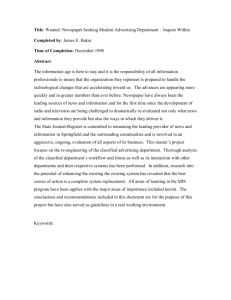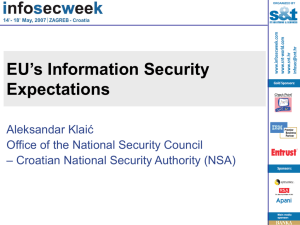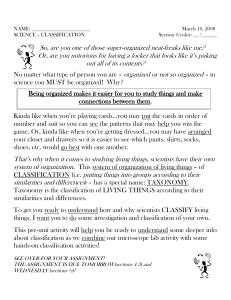Initial Security Briefing Job Aid - DoD Security
advertisement
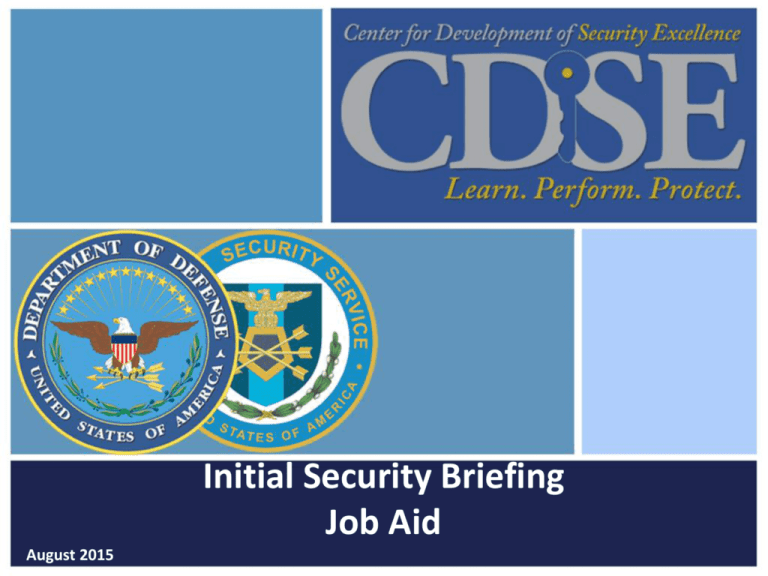
Initial Security Briefing Job Aid August 2015 A NOTE FOR SECURITY PERSONNEL: This initial briefing contains the basic security information personnel need to know when they first report for duty. This briefing is designed to be customizable to meet your organization’s operational requirement and local environment. The following tour will get you acquainted with the slide features available for navigation and customization. Slide Navigation When in “Slide Show View,” select icons to go to various sections Slide Show View Slide Show View occupies the full computer screen, exactly the way your presentation will look on a big screen when your audience sees it. You can see how your graphics, timings, movies, animated effects, and transition effects will look during the actual presentation. To exit Slide Show View, press ESC. Customizing Slides Red text is a placeholder where you can enter your local information as appropriate Adding Details Green text is a placeholder where you can provide additional details as appropriate Adding a New Slide This PowerPoint presentation contains several different slide designs. 1. To add a new slide, first select the position where the new slide will appear. You can do this by clicking on the slide within the left pane of PowerPoint. Yellow highlighting behind the slide indicates you have selected it. The new slide will appear after your selected slide. 2. Next, on the Home tab, in the Slides group, click the arrow next to New Slide and select the desired slide design. Or, if you want your new slide to have the same layout of the slide you have selected, you can just click New Slide instead of clicking the arrow next to it. Notes You can use the notes pane in Normal View to write notes about your slides. To get a Normal view, click on the View tab, and in the Presentation Views group, click Normal. • The Notes pane (circled in red) in Normal view • Blue arrows show the View tab and Normal view indicator Prepare your Presentation 1. Review every slide and determine how you would best speak to the topics listed on the slides. If helpful, write notes to help you remember additional details. 2. Identify slides with red and green text and add information as appropriate. After making edits, you can change the text color if desired. 3. Remove instructional slides from the beginning of the presentation. 4. Rehearse your presentation to determine approximate length. 5. If desired, print slides to distribute to your audience. INITIAL SECURITY BRIEFING TOPICS Physical Security Cybersecurity Personnel Security Public Release of Information Information Security Operations Security Antiterrorism Policies PURPOSE Understand National and DoD security policies to counter threats Identify threats to classified and unclassified government assets including, but not limited to: • Insider • Criminal and Terrorist Activities • Foreign Intelligence Entities • Foreign Governments PERSONNEL Know your security manager or security officer: Name Location Contact information PHYSICAL SECURITY PHYSICAL SECURITY Includes, but is not limited to: • Perimeter Fences • Prohibited items • Antiterrorism • Entry/exit inspections • Employee and visitor access • Escorting controls • Badging • Intrusion Detection Systems • Guards/patrols • Local procedures • Insert additional briefing topics as needed PERSONNEL SECURITY PERSONNEL SECURITY | SECURITY CLEARANCE Position sensitivity and/or duties determine level of clearance and access Clearance levels • Top Secret, Secret, or Confidential Local clearance investigation processing procedures • Insert language related to local procedures PERSONNEL SECURITY | BACKGROUND INVESTIGATION • Includes investigations for: • DoD Civilians • Military • Contractors • Conducted to determine suitability for granting a security clearance • Single Scope Background Investigation (SSBI) • Access National Agency Check and Inquires (ANACI) • National Agency Check with Law and Credit (NACLC) • Subject to continuous evaluation • SSBI-Periodic Reinvestigation (SSBI-PR) • Phased Periodic Reinvestigation (PPR) • NACLC PERSONNEL SECURITY | ACCESS REQUIREMENTS CLEARANCE ELIGIBILITY SF 312 NEED TO KNOW ACCESS PERSONNEL SECURITY | DEBRIEFING REQUIREMENTS • Coordinate access debriefing during out-processing Include or remove all that are applicable • SCI • SAP • NATO • COMSEC • Collateral Insert others as necessary PERSONNEL SECURITY | REPORTING REQUIREMENTS • Changes to: • Name • Marital Status • Citizenship • Adverse information • Based on facts NOT rumors • Self or co-worker Includes but not limited to: - Criminal activities - Alcohol or drug related incidents - Financial difficulties PERSONNEL SECURITY | REPORTING REQUIREMENTS • Loss, compromise, or suspected compromise of classified information • Secure information immediately • Report immediately to security or supervisor • Insert local procedures • Foreign contacts • Continuous contact with foreign nationals Includes, but is not limited to: - Cohabitation - Marriage • Suspicious contacts with or by foreign nationals • Member of immediate family or spouse’s immediate family is a citizen of a foreign country PERSONNEL SECURITY | REPORTING REQUIREMENTS • Foreign Travel • Insert local reporting procedures • Other employment or service • Foreign government, national, organization or entity, or a representative of any foreign interest (paid or unpaid) • Lost or stolen badges PERSONNEL SECURITY | REPORTING REQUIREMENTS Potential Espionage Indicators Exhibited by Others • Unexplained affluence • Verbal or physical threats • Keeping unusual work hours • Inquiring about operations/projects where no legitimate need to know exists • Divided loyalty or allegiance to the U.S. • Willfully disregarding security procedures • Unreported foreign contact and travel • Pattern of lying • Attempts to enlist others in illegal or questionable activity • Unauthorized removal of classified information • Fraud/Waste/Abuse of government credit cards INFORMATION SECURITY INFORMATION SECURITY • Pertains to the protection of classified and controlled unclassified information (CUI) from unauthorized disclosure, including, but not limited to: • Marking • Handling • Transmission • Storage • Destruction Provide additional guidance as necessary INFORMATION SECURITY | CLASSIFICATION LEVELS TOP SECRET Exceptionally Grave Damage to the National Security SECRET Serious Damage to the National Security CONFIDENTIAL Damage to the National Security INFORMATION SECURITY | TYPES OF MATERIAL Includes, but is not limited to: • Machinery • Reproductions • Documents • Storage media • Emails • Working papers • Models • Sketches • Faxes • Maps • Photographs INFORMATION SECURITY | MARKING Appropriately marked to alert recipients of the information’s classification TOP SECRET (TS) TOP SECRET ALL INDIVIDUALS HANDLING THIS INFORMATION ARE REQUIRED TO PROTECT PROTECT IT FROM UNAUTHORIZED DISCLOSURE IN THE INTEREST OF THE NATIONAL SECURITY OF THE UNITED STATES. HANDLING, STORAGE, REPRODUCTION AND DISPOSITION OF THE ATTACHED DOCUMENT MUST BE IN ACCORDANCE WITH APPLICABLE EXECUTIVE ORDER(S), STATUE(S) AND AGENCY IMPLEMENTING REGULATIONS. SECRET THIS IS A COVER SHEET FOR CLASSIFIED INFORMATION TOP SECRET ALL INDIVIDUALS HANDLING THIS INFORMATION ARE REQUIRED TO PROTECT PROTECT IT FROM UNAUTHORIZED DISCLOSURE IN THE INTEREST OF THE NATIONAL SECURITY OF THE UNITED STATES. SECRET (S) CONFIDENTIAL HANDLING, STORAGE, REPRODUCTION AND DISPOSITION OF THE ATTACHED DOCUMENT MUST BE IN ACCORDANCE WITH APPLICABLE EXECUTIVE ORDER(S), STATUE(S) AND AGENCY IMPLEMENTING REGULATIONS. THIS IS A COVER SHEET FOR CLASSIFIED INFORMATION SECRET ALL INDIVIDUALS HANDLING THIS INFORMATION ARE REQUIRED TO PROTECT PROTECT IT FROM UNAUTHORIZED DISCLOSURE IN THE INTEREST OF THE NATIONAL SECURITY OF THE UNITED STATES. HANDLING, STORAGE, REPRODUCTION AND DISPOSITION OF THE ATTACHED DOCUMENT MUST BE IN ACCORDANCE WITH APPLICABLE EXECUTIVE ORDER(S), STATUE(S) AND AGENCY IMPLEMENTING REGULATIONS. CONFIDENTIAL CONFIDENTIAL (C) INFORMATION SECURITY How Is Information Classified? • Original Classification • Only specific positions within the U.S. Government can originally classify information • Derivative Classification • All cleared and trained DoD and contractor personnel can be derivative classifiers Provide definitions of original classification and derivative classification according to EO 13526 and DoD Manual 5200.01 Volume 1 INFORMATION SECURITY What Information Can Be Classified? Only Information that falls under one or more categories of section 1.4 of Executive Order 13526 may be eligible to be classified: a) military plans, weapons f) United States Government systems, or operations programs for safeguarding nuclear materials or facilities b) foreign government information g) vulnerabilities or capabilities of systems, installations, c) intelligence activities (including infrastructures, projects, plans, covert action), intelligence or protection services relating sources, methods, or cryptology to the national security d) foreign relations or foreign h) the development, production, activities of the United States, or use of weapons of mass including confidential sources destruction e) scientific, technological, or economic matters relating to the national security INFORMATION SECURITY Information cannot be classified to: • Conceal violations of law, inefficiency, or administrative error • Prevent embarrassment to a person, organization, or agency • Restrain competition • Prevent or delay the release of information that does not require protection in the interest of the national security • Classify basic scientific research information not clearly related to national security INFORMATION SECURITY Classification Challenges • You have a responsibility to report information that you believe is improperly or unnecessarily classified. • Contact your security official for additional guidance for submitting a classification challenge. Insert local procedures INFORMATION SECURITY Safeguarding Classified Information • Must be under the positive control by an authorized person or stored in a locked security container, vault, secure room, or secure area • Must receive appropriate training prior to performing derivative classification duties and refresher training every two years thereafter • Must respect and understand the markings and the downgrade/declassification instructions on classified material • Discuss or send via secure communications • Process on approved equipment • Destroy by approved methods • Discuss in an area authorized for classified discussion INFORMATION SECURITY Sanctions • You may be subject to criminal, civil or administrative sanctions if you knowingly, willfully, or negligently: • Disclose classified information to unauthorized persons • Classify or continue the classification of information in violation of DoD regulations • Create or continue a Special Access Program (SAP) contrary to the requirements of DoD regulations • Disclose controlled unclassified information (CUI) to unauthorized persons • Violate any other provision of applicable DoD regulations • Contact your Security Official at phone number or other contact information for additional guidance INFORMATION SECURITY Sanctions • Sanctions may include, but are not limited to: • Warning • Reprimand • Loss or denial of classified access • Suspension without pay • Removal from employment • Discharge from military service • Criminal prosecution INFORMATION SECURITY Controlled Unclassified Information (CUI) • CUI is unclassified information that requires safeguarding or dissemination controls pursuant to and consistent with applicable law, regulation, and Government-wide policy. • Departments and agencies within the U.S. Government assign different CUI designations. • CUI designations include, but are not limited to: • For Official Use Only (FOUO) • Law Enforcement Sensitive (LES) • Sensitive But Unclassified (SBU) ANTITERRORISM ANTITERRORISM • Antiterrorism includes defensive measures used to reduce the vulnerability of individuals and property to terrorist acts, including limited response and containment by local military and civilian forces. • Additionally, antiterrorism includes actions taken to prevent or mitigate hostile actions against personnel (including family members), information, equipment, facilities, activities, and operations. • Personnel must participate in annual ATO Level I training; see your antiterrorism officer for local guidance. CYBERSECURITY CYBERSECURITY • Cybersecurity prevents damage to, protects, and restores information and information systems by ensuring their availability, integrity, authentication, confidentiality, and nonrepudiation. • Information systems include, but are not limited to: • Computers • Electronic communications systems/services • Personal Digital Assistant (PDA) (i.e. BlackBerry) CYBERSECURITY Responsibilities • Participate in annual cybersecurity training • Comply with password policy directives and protect passwords from unauthorized disclosure • Contact local security official for additional guidance PUBLIC RELEASE OF INFORMATION PUBLIC RELEASE OF INFORMATION • Release of government information must be approved by the Public Affairs Office (PAO) • Do not discuss classified or sensitive information with the media; refer inquiries to your local PAO • Insert local PAO or security official contact information OPERATIONS SECURITY OPERATIONS SECURITY • Operations Security (OPSEC) is a systematic process that is used to mitigate vulnerabilities and protect sensitive, critical, or classified information • Initial orientation at a minimum shall include an explanation of OPSEC, its purpose, threat awareness, the organization’s critical information, and the individual’s role in protecting it. • Contact local security official name for additional guidance POLICIES POLICIES Reference Security Policies and Regulations (not all inclusive): • Executive Order 13526 - Classified National Security Information • Executive Order 12968 - Access to Classified Information • DoDD 5205.02E, DoD OPSEC Program • DoDI 2000.12, DoD Antiterrorism (AT) Program • DoDI 8500.01, Cybersecurity • DoDM 5200.01, Vol. 1-4, DoD Information Security Program • DoD 5200.2-R, DoD Personnel Security Program • DoD 5200.08-R, DoD Physical Security Program • Homeland Security Presidential Directive (HSPD)-12, Policy for a Common Identification Standard for Federal Employees and Contractors QUESTIONS Contact List • Security Manager • Security Officer • Security Monitor • Antiterrorism Officer • OPSEC Officer • Information System Security Manager Add/delete as necessary
